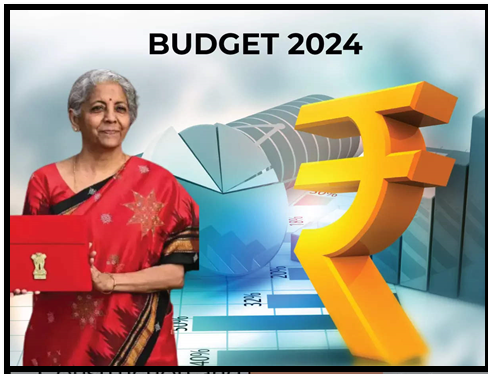THE UNION BUDGET: NAVIGATING INDIA’S ECONOMIC FUTURE AMIDST POLITICAL AND FINANCIAL CHALLENGES
Syllabus:
- GS-3- Indian budget ,economic slowdown and global challenges , Financing for different sectors
Focus :
- The article emphasizes the critical role of the Union Budget in detailing government finances, tax policies, and spending priorities. It highlights the need for citizens to scrutinize budget decisions and their implications on the economy, especially amidst changing political dynamics and economic distress.
Source - IE
Introduction
- Udit Misra discusses the significance and components of the Union Budget, presented by Finance Minister Nirmala Sitharaman.
- This budget marks the first of the third Narendra Modi government and the second budget presentation of the year.
Understanding the Union Budget
- A Budget outlines the government’s financial health, covering income, expenditure, and borrowing.
- It informs the public about past earnings, spending, and the borrowing needed to cover deficits, and provides estimates for the coming financial year.
Importance of the Union Budget
- While many focus on potential tax relief or cash handouts, the Budget fundamentally discusses taxpayers’ money.
- Government spending comes from taxpayer contributions or borrowing, which ultimately affects future generations.
- Margaret Thatcher emphasized that government money originates from the earnings of its citizens.
Key Components to Monitor in the Budget
- Tax Revenues:Tax buoyancy, or the responsiveness of tax revenues to GDP growth, is crucial for government income.
- Expenditure on Rural India and Small Businesses:These sectors still face economic distress, and the Budget’s approach to addressing their needs is vital for overall economic health.
- Subsidy Outgo:The government has limited funds for direct benefits, and the allocation of subsidies reveals its economic and political priorities.
- Fiscal Deficit:The fiscal deficit adds to the government’s debt, and achieving a prudent fiscal deficit (3% of GDP) remains a challenge.
- Overall Philosophy:The Budget indicates the new government’s approach to managing the economy, especially with a weaker mandate.
| About the Budget –
Components of the Budget:
Types of Expenditure:
Vote on Account vs Interim budget – Coverage:
Scope: Vote on Account does not include new policies or major changes in taxation. Interim Budget includes revenue and expenditure estimates but generally avoids major policy changes. Purpose: Vote on Account ensures continuity of government operations in the absence of a full budget. Interim Budget maintains financial planning and framework until the new government takes over. |
The Impact of the Union Budget on the Economy
- Union Budgets can shape the country’s economic trajectory by influencing citizen and business behaviors.
- Tax Policies:Adjusting tax rates can incentivize specific economic activities, potentially increasing overall revenues despite lower rates.
- Spending Priorities:Government spending choices can stimulate different economic sectors. For instance, boosting private sector investments versus enhancing consumer consumption.
Previous Government’s Strategy:
- The 2019-2024 government focused on incentivizing private investments through corporate tax breaks and infrastructure spending.
- However, muted business responses due to low consumer demand necessitate a potential shift towards boosting consumption.
Challenges and Considerations
- The changed political landscape, with the BJP no longer holding a majority in Lok Sabha, adds complexity to Budget decisions.
- Addressing widespread economic distress and employment issues is critical to regain public confidence and stimulate the economy.
- The new government may need to pivot its strategies to foster immediate consumption and long-term investments.
Conclusion
- The Union Budget is a crucial exercise reflecting the government’s financial management and economic vision.
- Monitoring tax policies, spending priorities, and fiscal strategies provides insights into the government’s approach to addressing economic challenges.
- The effectiveness of the Budget in balancing immediate relief and long-term growth will significantly impact India’s economic health.
Mains UPSC Question
Discuss the significance of the Union Budget in managing a country’s economy. What are the key components and considerations that citizens and policymakers must monitor to ensure balanced economic growth and financial health? (250 words)
Source:The Indian express
Associated article
https://universalinstitutions.com/budget-session-of-parliament/




